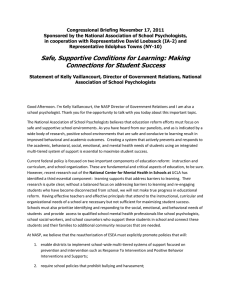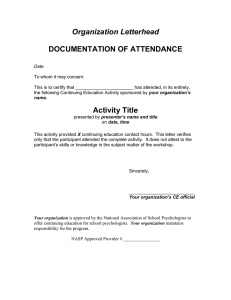Position Statement Ensuring High-Quality, Comprehensive Pupil Services
advertisement
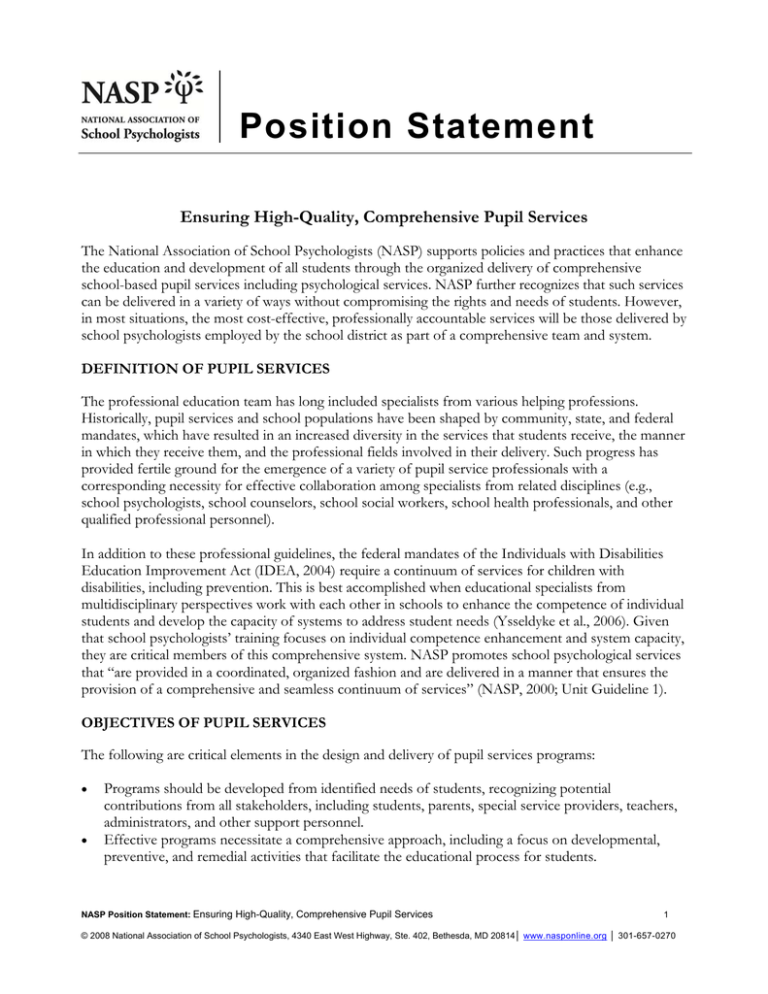
Position Statement Ensuring High-Quality, Comprehensive Pupil Services The National Association of School Psychologists (NASP) supports policies and practices that enhance the education and development of all students through the organized delivery of comprehensive school-based pupil services including psychological services. NASP further recognizes that such services can be delivered in a variety of ways without compromising the rights and needs of students. However, in most situations, the most cost-effective, professionally accountable services will be those delivered by school psychologists employed by the school district as part of a comprehensive team and system. DEFINITION OF PUPIL SERVICES The professional education team has long included specialists from various helping professions. Historically, pupil services and school populations have been shaped by community, state, and federal mandates, which have resulted in an increased diversity in the services that students receive, the manner in which they receive them, and the professional fields involved in their delivery. Such progress has provided fertile ground for the emergence of a variety of pupil service professionals with a corresponding necessity for effective collaboration among specialists from related disciplines (e.g., school psychologists, school counselors, school social workers, school health professionals, and other qualified professional personnel). In addition to these professional guidelines, the federal mandates of the Individuals with Disabilities Education Improvement Act (IDEA, 2004) require a continuum of services for children with disabilities, including prevention. This is best accomplished when educational specialists from multidisciplinary perspectives work with each other in schools to enhance the competence of individual students and develop the capacity of systems to address student needs (Ysseldyke et al., 2006). Given that school psychologists’ training focuses on individual competence enhancement and system capacity, they are critical members of this comprehensive system. NASP promotes school psychological services that “are provided in a coordinated, organized fashion and are delivered in a manner that ensures the provision of a comprehensive and seamless continuum of services” (NASP, 2000; Unit Guideline 1). OBJECTIVES OF PUPIL SERVICES The following are critical elements in the design and delivery of pupil services programs: Programs should be developed from identified needs of students, recognizing potential contributions from all stakeholders, including students, parents, special service providers, teachers, administrators, and other support personnel. Effective programs necessitate a comprehensive approach, including a focus on developmental, preventive, and remedial activities that facilitate the educational process for students. NASP Position Statement: Ensuring High-Quality, Comprehensive Pupil Services 1 © 2008 National Association of School Psychologists, 4340 East West Highway, Ste. 402, Bethesda, MD 20814│ www.nasponline.org │ 301-657-0270 Effective programs recognize that learning takes place within environmental and social contexts, and they take steps to assist schools in maintaining safe environments that support teaching and learning. Effective programs within the school are best delivered through multidisciplinary mental health teams that ensure culturally competent practice. Effective programs recognize that not all services can be provided in the school and include effective linkages with various community resources. Accountability through consistent, continuing, and effective program evaluation is crucial in both the development of effective programs and the ensuring of continuing community support. THE ROLE OF SCHOOL PSYCHOLOGISTS School psychologists are uniquely qualified to participate in comprehensive school-based pupil services. They are trained to deliver a broad spectrum of psychological services, develop and provide systemwide prevention activities, develop and monitor program services, direct intervention services, provide case consultation, and interpret data for program planning. Thus, in addition to providing services, school psychologists can assist in the important coordination of these potentially overlapping services. ALTERNATIVES TO SCHOOL-BASED PUPIL SERVICES During times of economic crisis and personnel shortages, school districts may consider alternatives to employing their own pupil personnel (including school psychologists), such as contracting out for specific services or general staff reductions. The availability of third-party reimbursement may make arrangements with private providers appear attractive. NASP believes these staffing procedures are detrimental to the best interests of the child, family, and school system. Therefore, it is essential that administrators and policy makers understand the nature and potential limitations of specific mental health service options. When making decisions about service options, it is important to maintain strong pupil service programs in order to make cost-effective decisions that do not sacrifice the quality or availability of services to students. Independent contracting for school psychological services includes a variety of arrangements, such as privatization and subcontracting through other public agencies. Some school districts have implemented contracts with agencies or individuals which shift the delivery of services from the public to the private sector, or have contracted for services through public cooperative units that supplement or supplant school-based services with “co-located” services of community agencies. NASP does not oppose the provision of comprehensive psychological services through community providers as long as such services do not supplant the services of district-employed school psychologists. In fact, NASP recognizes that the provision of limited contractual resources may augment district resources and contribute to the delivery of comprehensive services. NASP also advocates that all pupil service personnel, whether or not they are employed by school districts, should be trained and credentialed in a manner that will assure that (a) the welfare and best interests of the student are the primary concern of the service provider; (b) the amount, range, and quality of services are increased rather than decreased; (c) due process rights of students are upheld; and (d) professionals practice in a manner that is consistent with professional guidelines, research evidence, legal requirements, and NASP ethical standards. However, these contracted services should never decrease the availability of comprehensive services delivered by district-employed personnel. This is a critical issue because school psychologists employed by the school districts typically do the following: NASP Position Statement: Ensuring High-Quality, Comprehensive Pupil Services 2 © 2008 National Association of School Psychologists, 4340 East West Highway, Ste. 402, Bethesda, MD 20814│ www.nasponline.org │ 301-657-0270 Offer cost effective services including prevention, early intervention, and wellness activities that eliminate the need for more costly services. Are readily available to other school personnel, students, and the community for crisis intervention and rapid response. Understand issues from a school system’s perspective. Are sufficiently familiar with the students, staff, legal requirements, and policies of the school system to facilitate communication and defuse potentially dangerous or adversarial situations. Provide accessible, culturally competent mental health services to children and families, including direct service to groups and individuals, evaluation, and consultation with the family and school staff. Provide a wide range of services to students, staff, and families that would not be easily or inexpensively purchased via private contracts. SUMMARY The effective delivery of pupil services is essential to education. Meeting diverse student needs requires a school-based multidisciplinary team approach that utilizes open communication, mutual trust and respect, and ongoing collaboration of professionals from each specialty area. A well-coordinated comprehensive pupil service delivery system allows schools to meet the commitment to serve this country’s school-aged youth in order to enhance student competence and achievement and to facilitate the capacity of school systems to meet student needs. Both of these goals are lofty, yet obtainable. REFERENCES Individuals with Disabilities Education Improvement Act (IDEA). (2004). Public Law 108–446 (CFR Parts 300 and 301). National Association of School Psychologists. (2000). Guidelines for the provision of school psychological services, Bethesda, MD: Author. Ysseldyke, J., Burns, M., Dawson, P., Kelley, B., Morrison, D., Ortiz, S., Rosenfield, S., Telzrow, C. (2006). School psychology: A blueprint for training and practice III. Bethesda, MD: National Association of School Psychologists. Adopted by the NASP Delegate Assembly on July 20, 2008. Please cite this document as: National Association of School Psychologists. (2008). Ensuring high-quality, comprehensive pupil services (Position Statement). Bethesda, MD: Author. NASP Position Statement: Ensuring High-Quality, Comprehensive Pupil Services 3 © 2008 National Association of School Psychologists, 4340 East West Highway, Ste. 402, Bethesda, MD 20814│ www.nasponline.org │ 301-657-0270
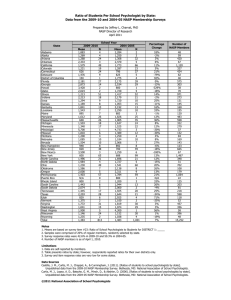

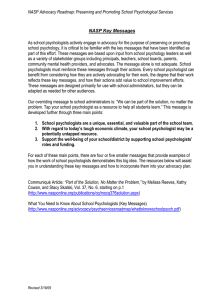

![[Today’s Date] [Your Supervisor’s First Name] [Your School or District’s Name]](http://s2.studylib.net/store/data/010451343_1-ed5410b4013e6d3fbc1a9bbd91a926a9-300x300.png)
